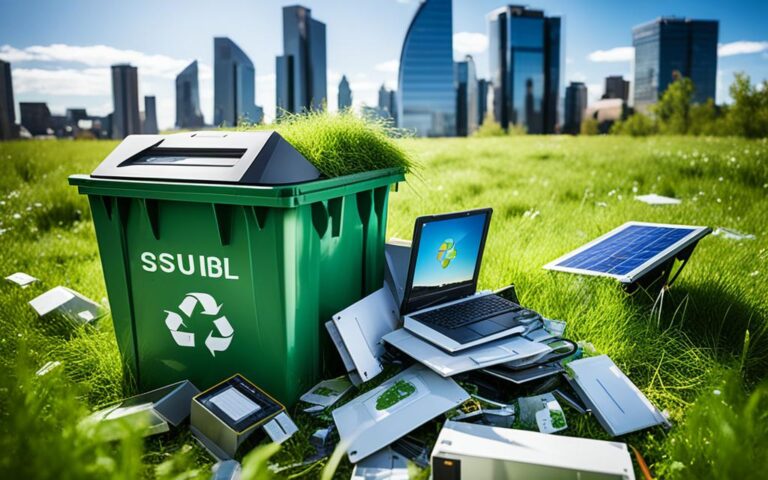The Environmental and Social Benefits of Recycling Desktops
Recycling desktops can have significant environmental and social benefits. By donating old computers to a computer reuse charity, you can extend the lifespan of the devices, reduce the need for resource-heavy production processes, and save fossil fuels. Proper recycling ensures that toxic chemicals are prevented from being released into the environment, and 0% of e-waste goes to landfill. Additionally, recycling old computers can provide valuable IT access, increase incomes, create opportunities for volunteers, and contribute to a fairer, more sustainable future.
As technology continues to advance at a rapid pace, the need for responsible e-waste management becomes increasingly crucial. Recycling desktops not only helps protect the environment but also has a positive social impact. By diverting e-waste from landfills, recycling reduces pollution, conserves limited land resources, and promotes the recovery and reuse of valuable materials. Furthermore, computer recycling can bridge the digital divide, providing IT access to underserved communities and empowering individuals with essential skills for the modern workforce.
In the following sections, we will explore in more detail the environmental impact, social impact, economic benefits, and social benefits of computer recycling. We will also discuss legislation and regulations related to responsible e-waste management. It is essential for individuals, businesses, and governments to actively participate in recycling efforts to create a more sustainable and equitable society.
The Environmental Impact of Computer Recycling
Computer recycling plays a crucial role in minimizing the environmental impact of electronic waste. By reusing and extending the lifespan of old computers, the need for resource-intensive production processes is significantly reduced. This not only conserves valuable resources but also saves fossil fuels and reduces carbon emissions.
Every computer that is reused instead of being discarded creates a significant positive environmental impact. For instance, The Turing Trust, a renowned computer reuse charity, states that each reused computer produces enough embodied energy savings to power 16 televisions for a year. By extending the lifespan of these devices, the energy and resources required for manufacturing new computers are significantly reduced.
“By extending the lifespan of old computers through reusing and recycling, we can reduce the need for new production processes and thereby conserve valuable resources and reduce our carbon footprint.”
– The Turing Trust
In addition to reducing the need for resource-heavy production, computer recycling also prevents the release of toxic chemicals into the environment. If old computers are not properly disposed of, hazardous materials such as lead, mercury, and arsenic can contaminate soil, water, and air, posing significant risks to human health and the ecosystem.
Responsible computer recycling ensures that these toxic substances are safely and responsibly processed through accredited downstream partners. By adhering to strict recycling practices, these partners minimize the environmental impact of computer disposal and ensure the proper handling of hazardous materials in accordance with environmental regulations.
| Environmental Benefits of Computer Recycling | Description |
|---|---|
| Reduces the need for resource-intensive production | By reusing and extending the lifespan of old computers, the demand for new devices and the accompanying resource-intensive manufacturing processes are significantly reduced. |
| Saves fossil fuels and reduces carbon emissions | By conserving energy through reusing computers, the carbon emissions associated with the production and disposal of new devices are minimized. |
| Prevents the release of toxic chemicals | Proper computer recycling ensures that hazardous materials are safely and responsibly handled, preventing their release into the environment. |
The Social Impact of Computer Recycling
Computer recycling plays a crucial role in shaping a more socially inclusive and equitable society. By donating old computers to charities and organizations, individuals and communities can gain valuable access to technology, opening up a world of opportunities that may have otherwise been inaccessible.
Access to technology is a powerful catalyst for socioeconomic growth and empowerment. With the increasing reliance on digital tools and platforms in various industries, having IT skills can significantly enhance individuals’ employability and income potential. Studies have shown that individuals proficient in IT earn approximately 39% higher incomes compared to those without such skills. By recycling computers and providing access to technology, we can bridge the digital divide, promoting social mobility and economic advancement.
Furthermore, computer recycling creates meaningful opportunities for individuals to contribute to their communities. By volunteering in computer recycling programs, individuals can develop valuable skills, gain work experience, and foster relationships with like-minded individuals who share a passion for making a positive social impact. Through collective efforts, we can build stronger, more connected communities that drive positive change.
“Computer recycling not only benefits the environment but also empowers individuals and strengthens communities. Access to technology can transform lives, enabling individuals to improve their socioeconomic status and contribute to a more inclusive society.” – Jane Thompson, Founder of Tech4All.
By donating just one device, you can make a lasting impact on society for years to come. The positive social ripple effect of computer recycling is undeniable. Every computer that finds a new home translates into a life transformed, an individual empowered, and a community strengthened. Together, we can drive social change through the responsible and inclusive practice of computer recycling.
As we continue to advocate for environmental sustainability, let us not overlook the powerful social implications of computer recycling. By embracing this practice, we can create a more equitable and inclusive future, where technology serves as a catalyst for positive change. Join us in the journey towards a more socially impactful world.
The Environmental Benefits of Computer Recycling
Computer recycling plays a crucial role in conserving the environment and promoting sustainability. By diverting e-waste from landfills, it helps reduce landfill waste and conserve limited land resources. Recycling computers also contributes to the recovery and reuse of valuable materials, such as metals and plastics. This reduces the need for environmentally damaging mining practices, which can have devastating effects on ecosystems and contribute to carbon emissions.
The proper disposal of toxic materials through recycling is essential in preventing pollution and protecting our precious ecosystems. Toxic substances like lead, mercury, and flame retardants, commonly found in electronic devices, can contaminate soil and water sources if not handled properly. By recycling old computers, these harmful chemicals can be safely disposed of, preventing their release into the environment and safeguarding human health.
Moreover, computer recycling enables the responsible management of electronic waste. When e-waste is disposed of improperly, it can leach toxic substances into the soil and water, polluting the environment and endangering wildlife. By recycling computers, we ensure that these hazardous materials are handled in compliance with regulations and best practices, mitigating the environmental impact of electronic waste.
The Three Key Environmental Benefits of Computer Recycling:
- Reduction of landfill waste: By diverting computers from landfills, we significantly reduce the amount of waste that ends up occupying precious land resources. This helps conserve land, which can then be used for more sustainable purposes.
- Conservation of valuable resources: Recycling computers allows for the recovery and reuse of valuable materials like metals and plastics. This reduces the need for extracting and processing new raw materials through environmentally damaging methods, such as mining.
- Prevention of pollution and protection of ecosystems: Proper disposal of toxic materials found in computers prevents the release of harmful substances into the environment. This safeguards ecosystems and prevents the contamination of soil, water sources, and wildlife habitats.
To visualize the positive environmental impact of computer recycling, refer to the table below:
| Environmental Impact | Data |
|---|---|
| Saved land resources due to reduced landfill waste | Thousands of acres |
| Conserved resources through material recovery | Tons of metals and plastics |
| Avoided toxic emissions from improper disposal | Tons of toxic chemicals |
Computer recycling offers significant environmental benefits by reducing landfill waste, conserving resources, and preventing pollution. By disposing of old computers responsibly, we contribute to a cleaner, healthier planet for future generations.
The Economic Benefits of Computer Recycling
Computer recycling not only brings about positive environmental effects, but it also yields substantial economic advantages. By engaging in computer recycling, employment opportunities are created throughout various stages of the recycling process. This includes collection, sorting, refurbishment, and recycling activities, all of which contribute to job creation and stimulate economic growth.
Moreover, recycling computers enables the recovery of valuable materials that can be reused in the manufacturing of new electronic devices. This reduces the dependence on costly raw materials and lowers manufacturing costs, leading to significant economic savings. By extending the lifespan of existing devices through recycling, businesses can also avoid potential fines associated with improper disposal, resulting in further cost savings.
| Economic Benefits of Computer Recycling | Description |
|---|---|
| Job Creation | Computer recycling generates employment opportunities in collection, sorting, refurbishment, and recycling. |
| Reduced Manufacturing Costs | Recovering valuable materials from recycled computers reduces the need for expensive raw materials and lowers manufacturing costs. |
| Cost Savings | Recycling old computers extends their lifespan, helping businesses avoid fines for improper disposal and reducing the need for new device purchases. |
Therefore, adopting computer recycling practices not only contributes to a sustainable and greener future but also provides economic benefits that can positively impact businesses and society at large.
The Social Benefits of Computer Recycling
Computer recycling offers numerous social benefits that contribute to a more inclusive and digitally empowered society.
By bridging the digital divide, recycling computers provides access to technology for underserved communities, enabling them to participate in the digital world and gain essential skills for the modern workforce. Through the donation of computers to charitable organizations, refurbished devices can be redistributed to those in need, including disadvantaged students, refugees, and individuals with limited resources.
Proper computer recycling also prioritizes data security and privacy, ensuring that sensitive information is securely erased or destroyed. This not only protects individuals from potential data breaches but also safeguards the integrity of personal and confidential information.
| Benefits of Computer Recycling | Description |
|---|---|
| Access to Technology | Connects underserved communities to the digital world, providing opportunities for education, employment, and communication. |
| Redistribution of Devices | Enables the provision of refurbished computers to disadvantaged individuals, empowering them with essential tools for success. |
| Data Security and Privacy | Prioritizes the secure erasure or destruction of sensitive information to safeguard against data breaches and privacy violations. |
By focusing on the social benefits of computer recycling, we can create a more inclusive and equitable society that harnesses the power of technology to bridge gaps, empower individuals, and foster digital literacy.
Legislation and Regulations for Computer Recycling
Government legislation and regulations play a crucial role in promoting responsible computer recycling. Many countries have implemented laws that require responsible e-waste management, encouraging manufacturers, consumers, and recycling facilities to adhere to specific recycling standards. These regulations aim to minimize the negative environmental and social impacts of e-waste and ensure proper disposal and recycling practices.
For instance, in the United Kingdom, the Waste Electrical and Electronic Equipment (WEEE) Regulations were introduced to address the growing concern of electronic waste. Under these regulations, producers are responsible for financing the collection, treatment, and recycling of end-of-life electronic equipment. This ensures that the burden of responsibility is shared among all stakeholders, contributing to a more sustainable approach to computer disposal.
Furthermore, the European Union’s Restriction of Hazardous Substances (RoHS) directive restricts the use of hazardous substances in the manufacturing of electronic equipment. This directive aims to protect human health and the environment by reducing the presence of harmful substances, such as lead, mercury, and cadmium, in electrical and electronic products.
“Government legislation and regulations are essential to ensure that computer recycling is carried out responsibly, minimizing the environmental and social impact of electronic waste. By setting specific standards and enforcing compliance, these regulations create a framework for sustainable practices in the industry.”
These regulations also require proper labeling and documentation of electronic products to ensure their traceability and facilitate the recycling process. By implementing these measures, governments are taking proactive steps to reduce the environmental footprint of computer recycling and protect the health and well-being of their citizens.
Moreover, international organizations such as the Basel Convention on the Control of Transboundary Movements of Hazardous Wastes and their Disposal provide a global framework for the control and management of hazardous wastes, including e-waste. The convention aims to ensure that the transboundary movement of hazardous wastes is conducted in an environmentally sound manner, minimizing the risk of pollution and harm to human health.
By enforcing legislation and regulations, governments are promoting the responsible management of electronic waste and encouraging the adoption of sustainable practices throughout the computer recycling industry. These measures are instrumental in safeguarding the environment, protecting human health, and promoting a circular economy where valuable resources are conserved and waste is minimized.
By staying informed about the legislation and regulations governing computer recycling, individuals, businesses, and recycling facilities can contribute to a more sustainable future. Compliance with these regulations not only helps protect the environment but also strengthens the social and economic aspects of computer recycling.
Conclusion
Recycling desktops offers significant environmental and social benefits. By extending the lifespan of old computers, we can reduce the need for resource-intensive production processes, leading to a positive impact on our environment. This means fewer fossil fuels are required, and there is a reduction in carbon emissions.
Moreover, recycling desktops prevents the release of toxic chemicals into the environment, ensuring responsible disposal through accredited downstream partners. This not only protects our ecosystems but also contributes to a safer and healthier planet.
On the social front, recycling desktops provides valuable IT access to individuals and communities who may not have had access otherwise. This can lead to increased incomes and better job opportunities, as IT skills are in high demand. Recycling also creates opportunities for volunteers to develop new skills and contribute to a fairer, more sustainable future.
It is essential for individuals, businesses, and governments to actively participate in responsible e-waste management to promote a more sustainable and equitable society. By recycling our desktops, we can make a positive impact on both the environment and society as a whole.
FAQ
What are the environmental and social benefits of recycling desktops?
Recycling desktops can extend the lifespan of devices, reduce the need for resource-heavy production processes, save fossil fuels, prevent the release of toxic chemicals into the environment, and ensure responsible disposal. Additionally, recycling old computers can provide valuable IT access, increase incomes, create opportunities for volunteers, and contribute to a more sustainable future.
What is the environmental impact of computer recycling?
Computer recycling reduces the need for resource-intensive production processes, saves fossil fuels, and reduces carbon emissions. It also prevents the release of toxic chemicals into the environment and ensures responsible disposal through accredited downstream partners.
What is the social impact of computer recycling?
Donating old computers to charities provides valuable IT access, which can lead to increased income and better job opportunities. Recycling computers also creates opportunities for volunteers to develop new skills, gain work experience, and foster relationships with like-minded individuals.
What are the environmental benefits of computer recycling?
Computer recycling diverts e-waste from landfills, reduces landfill waste, conserves limited land resources, and allows for the recovery and reuse of valuable materials. Proper disposal of toxic materials through recycling also prevents pollution and protects ecosystems.
What are the economic benefits of computer recycling?
Computer recycling creates employment opportunities in various stages of the recycling process, stimulates job creation and economic growth, and allows for the recovery of valuable materials that can be reused in the manufacturing of new electronic devices. It can also result in cost savings for businesses by extending the lifespan of existing devices and avoiding potential fines for improper disposal.
What are the social benefits of computer recycling?
Computer recycling bridges the digital divide by providing access to technology for underserved communities, allows for the redistribution of refurbished devices to those in need, and prioritizes data security and privacy.
What role do legislation and regulations play in computer recycling?
Government legislation and regulations aim to promote responsible e-waste management by encouraging adherence to specific recycling standards. These regulations minimize negative environmental and social impacts and ensure proper disposal and recycling practices.
How can I learn more about server recycling in the UK?
To learn more about server recycling in the UK, you can visit https://it-recycle.uk/server-recycling-uk/.















